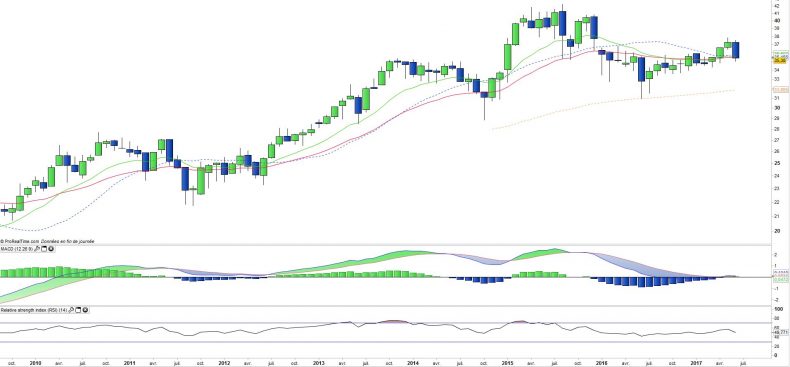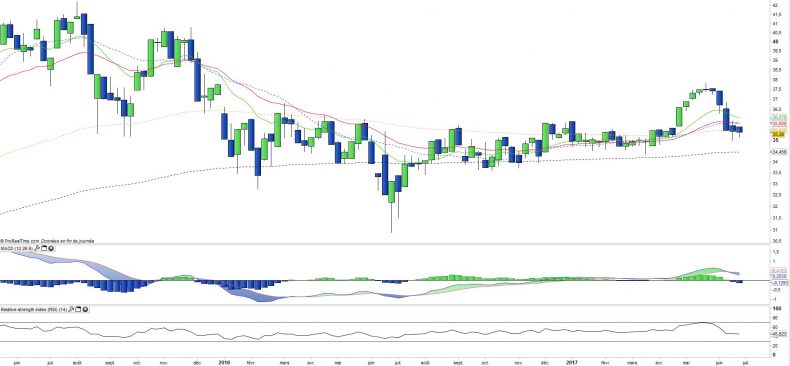Lyxor Stoxx Europe 600 Retail - RTA - 29/06/2017
Short term strategy : Negative (10%)
Long term strategy : Positive (70%)
Characteristics of the ETF
RTA (Lyxor ETF) replicates the Stoxx Europe 600 Retail index (SXRR) which is composed of the main European retail stocks.
This index is relatively concentrated, with only 29 holdings. The index is mainly composed of large capitalisations, with Inditex at the first place, which accounts for 15% of the index and has more than €100bn market capitalisation.
The true advantage of this basket is its diversification from a business perspective. It is composed of food retailers stocks, i.e. hypermarkets (Tesco, Carrefour, Ahold, casino...), which are generally structurally defensive, but for some are in the search for new business models or to refocus on their domestic markets, because of difficult emerging markets and sometimes excessive debt. Other companies such as Inditex, Next, Hennes & Mauritz or Kering are rather related to textile/fashion therefore essentially growth stocks, while this index also includes stocks such as Kingfisher which are specialty distributors with a predominantly cyclical business model. All in all a varied Index with moderate volatility, while Inditex is a pole of stability by its weight and growth momentum.
The expenses of this ETF are relatively moderate at 0.3%. The Fund is rather illiquid at 13 M €, which makes it a diversification product only.
The sector posted a negative performance of -5.8% in 2016, underperforming the Stoxx600 and lost 0.5% since the beginning of the year. The index lagged the rest of the market, hurt by a lack of catalyst and weak consumption in Europe. But the recently purchasing of Whole Food Markets for US $13.7 bn by Amazon is seen as a direct threat to the large Food retailers, and primarily those with a US base, such as Ahold Delhaize. The stock fell by more than 15 per cent within 2 days after the announcement. This threat will probably not have an immediate impact on the margins of traditional retailers, but will further tighten the competitive environment and further cloud the long-term outlook, which could justify a higher risk premium for investors.
In the short term, however, the reaction is probably excessive.
Monthly data
The analysis of monthly charts shows the heavily negative impact caused by the new purchase of Whole Food Market by Amazon. The upward trend was accelerating and was cut off roughly. The June candle, however must be downplayed : its magnitude is not so large (-5%) and is still common in comparison with previous corrections as in 2016. On the other hand, there was no bearish breakout of the 13&26 moving averages and RTA is just above, while oscillators remain positive.
A rebound is possible and could allow the index to gradually resume its initial positive trend.
Weekly data
Analysis of weekly charts shows some stabilisation of the index after the fall in early June. Candles are smaller, with tails fuses, which could pave the way for a rebound. MACD has experienced a downward crossing, but in the high upper zone and remains above the zero line. The good news is that moving averages do not cross downward, and the medium term trend remains valid. The nature of the upcoming rebound to come, and its magnitude size is likely to decide on the next trend.
The situation is worrying but not hopeless.
ETF objective
RTA is a UCITS compliant ETF that aims to track the benchmark index Stoxx Europe 600 Retail Net Return.
Characteristics
| Inception date | 25/08/2006 |
| Expenses | 0,30% |
| Benchmark | SXRR - stoxx 600 Retail |
| Issuer | Lyxor |
| code/ticker | RTA |
| ISIN | FR0010344986 |
| Category | UCITS |
| Currency | EUR |
| Exchange | Euronext Paris |
| Asset Under Management | 13 M€ |
| Replication method | Indirect (via a swap) |
| Dividend | capitalised |
| PEA (France) | Yes |
| SRD (France) | Yes |
| Currency risk | Medium |
| Number of holdings | 29 |
| Risk | 3/5 |
Country breakdown
| United Kingdom | 31% |
| Spain | 19% |
| France | 17% |
| Sweden | 10% |
| Netherlands | 10% |
| Germany | 4% |
| Switzerland | 4% |
| Others | 6% |
Sector breakdown
| Consumer discretionary | 55% |
| Consumer Staples | 40% |
| Health Care | 2% |
| Information Technology | 2% |
| Financials | 1% |
Top ten holdings
| Inditex | 17% |
| Konin Ahold | 10% |
| Kering | 10% |
| Hennes & Mauritz | 9% |
| Tesco | 7% |
| Carrefour | 6% |
| Kingfisher | 3% |
| Next Plc | 3% |
| WM Morrison | 3% |
| Marks & Spencer | 3% |


